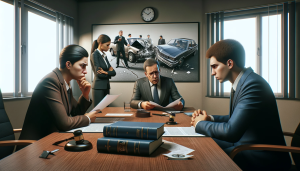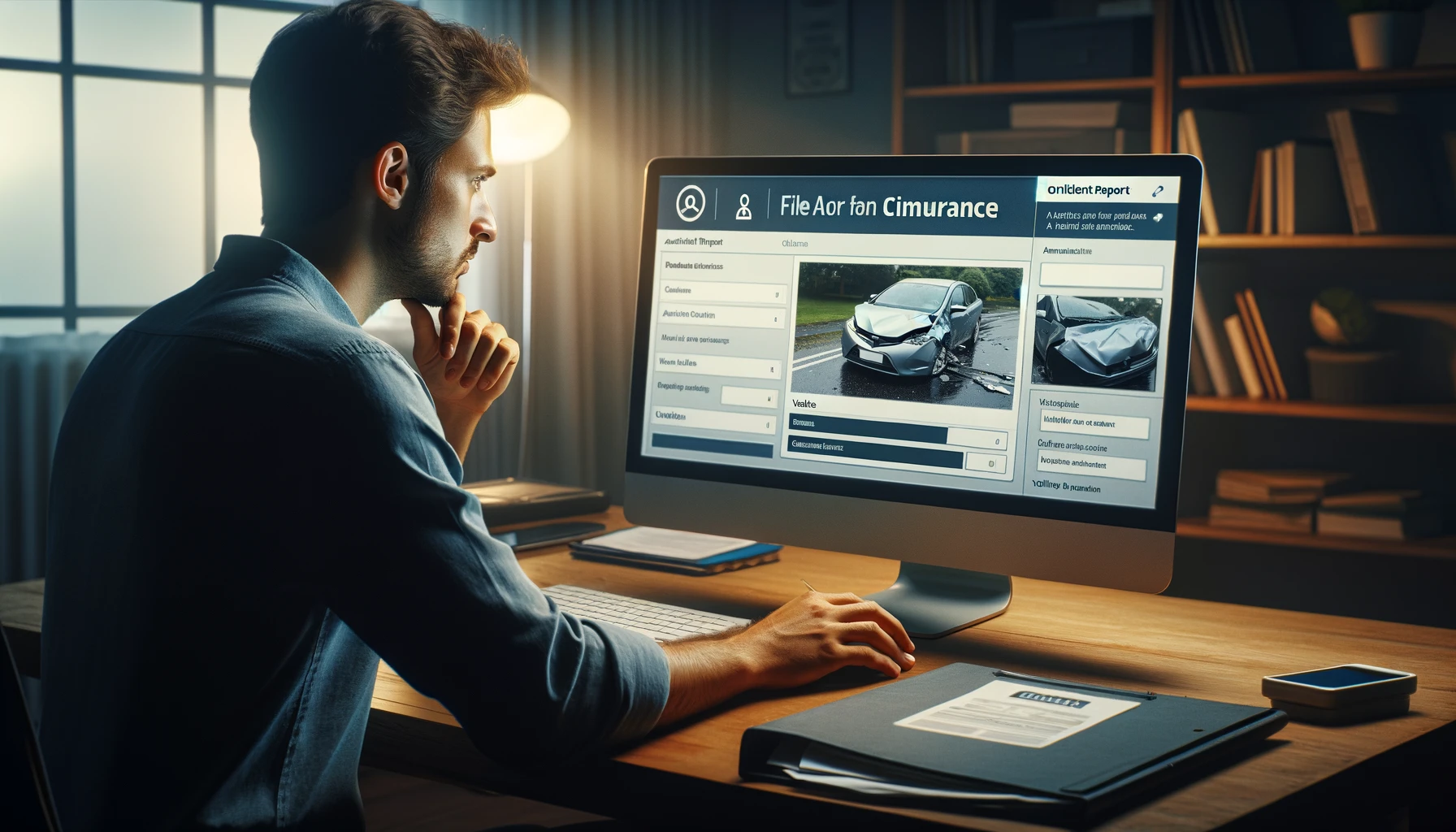Understanding the Basics of Collision Insurance Claims
What is Collision Insurance?
Collision insurance is a type of car insurance that covers the cost of repairing or replacing your vehicle if it's involved in a collision, regardless of who is at fault. It applies when you collide with another vehicle or object (like a tree or a fence), or even if your car flips over. It's important to note that collision coverage is optional, and generally it comes into play after you've paid your deductible.
The Role of Deductibles in Collision Claims
A deductible is the amount you're responsible for paying out-of-pocket before your insurance coverage kicks in. For instance, if you have a $500 deductible and the cost to repair your car after a collision is $2000, you will pay the first $500 and your insurance company will cover the remaining $1500. Typically, a higher deductible means lower premium costs but more out-of-pocket expenses when a collision occurs.
Process of Filing a Collision Insurance Claim
To start a collision claim, you must first report the incident to your insurance company as soon as possible. They will ask for details about the collision including the where, when, and how it happened. You should provide any helpful documentation, like a police report or photographs of the damage. An insurance adjuster will then assess the damage to your vehicle, usually by inspecting it in person. After the evaluation, the adjuster will determine how much the insurance company will pay towards repairs or replacement of your vehicle.

Factors Affecting a Claim’s Outcome
Several elements can impact the outcome of your collision insurance claim. These include the severity of the damage to your vehicle, your policy limits, and if any policy exclusions apply. For example, if the cost of repairs exceeds the current value of your car ('totaled'), the insurer may choose to offer a payout based on your vehicle's actual cash value instead of covering repair costs.
What is NOT Covered by Collision Insurance?
Though collision insurance covers your vehicle in many instances, it's crucial to understand what it doesn't cover. It does not cover damage to another person’s vehicle or property - that falls under liability coverage. Similarly, collision coverage doesn’t cover medical bills for
Injuries suffered in the
Accident. Comprehensive coverage would be needed to cover damages to your vehicle not caused by a collision, such as theft, fire, or vandalism.
Steps to Take Immediately After a Collision
Assess The Situation
Right after a collision, your first priority should be ensuring the safety of everyone involved. Check yourself and passengers for any
Injuries. If it’s safe to do so, move out of the roadway to avoid causing more
Accidents. If anyone is seriously injured or the vehicles are too damaged to move, call 911 immediately.
Notify Authorities
After you're certain of your safety, it's important to notify the authorities about the incident. The police can provide vital help in managing the aftermath of a collision. They will ensure traffic flow, get medics if necessary, and produce an
Accident report. This report can be crucial when filing your insurance claim.
Gather Information
Critical to your insurance claim process is the information you gather at the scene of the collision. Exchange information with the other driver including names, contact details, insurance information, vehicle details, license plate numbers, and driver's license numbers. Also, take pictures of the collision scene and the damages to vehicles.
Contact Your Insurance Provider
As soon as possible after the collision, contact your insurance provider to report the incident. Provide them with all relevant information and cooperate fully. Their instructions and requirements for the claim process can be specific depending on the provider, so be sure to ask for clarification if needed.
Seek Medical Attention
Whether you believe you've been hurt or not, it's crucial to seek medical attention.
Injuries from collisions can sometimes be latent, only becoming apparent hours, days, or even weeks later. Having a medical record following the collision can support any future insurance claim related to
Personal injury.
Contacting Your Insurance Company
Initial Steps for Reporting the Accident
Before you initiate any contact with your insurance company, gather all necessary documents such as
Accident reports, medical records, pictures of the scene, and witness testimonials if available. Once you have compiled all the required information, it's time to reach out to your insurance provider.
Notifying Your Insurance Provider
The first step in this process is to notify your insurance company about the collision. Most companies prefer to be notified as soon as possible after the incident has occurred. You can typically contact them via phone, online portal, or mobile app. Make sure to accurately state all facts when reporting an incident, providing all collected evidence.
The Claim’s Process
Upon contacting your insurance company, a representative will guide you through their claim's process. This generally involves reviewing your policy coverage, deductibles, and the process for repairing your vehicle. They may also provide guidance on how to manage any medical expenses, lost wages, or other collision-related costs.
Working with an Insurance Adjuster
After filing the claim, an insurance adjuster will be assigned to investigate your case. Expect to have further communication with this person as they assess the damage to your vehicle and determine the amount of compensation. It's critical to be cooperative, but remember you have the right to question and understand their decisions.
Settlement and Follow-up
Your insurance company will eventually offer a settlement based on the findings of the adjuster. Understand that you are not obligated to accept the first offer. You may negotiate if you feel the amount is unsatisfactory. After a settlement is reached, ensure to follow-up on any further instructions provided by your insurer.
Assessing the Damage and Getting Repairs
Evaluating Collision Impact
Once you've ensured the safety of everyone involved and contacted the necessary authorities, the next step is to assess the damage to your vehicle. Take detailed notes about what you see. Check for visible damages such as dents, scratches and shattered windows. Also pay attention to potentially hidden damage, such as issues with alignment or leaks from the engine. Photographs can provide concrete evidence of the state of your vehicle immediately after the collision.
Importance of a Professional Assessment
While your initial evaluation provides a starting point, it's crucial to have a professional inspect the vehicle as well. A certified mechanic or repair shop can identify damages that are not easily noticeable but could lead to serious problems down the line. This thorough inspection will be essential in determining the extent of the collision coverage needed from your insurance.
Contacting Your Insurance Provider
After the mechanical inspection, reach out to your insurance provider as soon as possible. Provide them with the details of the
Accident, your assessment and the professional opinion. The sooner they receive this information, the quicker they can begin processing your claim. Some insurance companies offer mobile apps that allow you to submit photos and documentation directly, speeding up the process.
Working with an Insurance Adjuster
Your insurance company will likely send an adjuster to determine the cost of repairs or replacement. They'll consider the type, extent, and location of the damage, as well as the overall condition of the vehicle. It's important to be present during this evaluation to ensure the adjuster gets a complete understanding of the damage. Center your discussion around the facts and remember to share the report of your professional mechanic.
Securing and Reviewing Repair Estimates
Once the adjuster has made their assessment, they will provide a repair estimate. Ensure that this estimate includes all necessary repairs. If there's disagreement, don't hesitate to get alternative estimates from different repair shops or experts. Being proactive about this process can facilitate a fair settlement and help expedite the insurance claim. It's important to remember that you have the final say as to who will repair your vehicle.
Handling the Claim Process
Step 1: Gathering Essential Details
Begin by collecting the necessary information about the collision. This includes details about the location, time, and conditions under which the collision occurred. Additionally, gather information about the parties involved in the collision, their vehicle types, branding, color, and license plates. Photographic evidence from the scene can also be beneficial if it's safe and legal to take them.
Step 2: Reporting the Incident to Your Insurance Firm
After collating relevant details, report the incident to your insurance company as soon as possible. Delays could potentially affect the claim process negatively. Make sure you provide accurate information, as false statements can lead to a denial of your claim or even policy cancellation.
Step 3: Filing Your Claim
Your insurance agency will provide you with forms to fill out to file your claim. Ensure you fill them accurately and completely, providing all the details they require. Remember, most insurance firms have online portals to make this task easier and faster. Keep copies of all documents submitted for your records.
Step 4: Inspection and Assessment of Damage
Once your claim is filed, your insurance company will send an adjuster to inspect the damage to your vehicle. They'll evaluate the cost of repairs based on your coverage and determine fault based on the
Accident details you presented.
Step 5: Settlement Process
After assessment, your insurer will then decide whether to repair, replace, or compensate for the loss of your vehicle. They will issue a payout in line with your policy agreement. Note that you may need to pay a deductible before your policy covers the remainder. The timeframe for receiving this payout can vary significantly between different insurers and policies.
Dealing with Potential Disputes
Identifying Collision-Related Conflicts
It is essential to understand that disputes may arise during the process of claiming insurance for a collision. These conflicts could stem from disagreements between you and your insurer about the damage extent, repair costs, or collision circumstances. Understanding these points of contention can help you better prepare yourself to handle any potential disputes.
Understanding Your Insurance Policy
Having a thorough knowledge of your insurance policy can play a crucial role in dispute management. You must be fully aware of what your insurance covers and does not cover. Familiarize yourself with the process of making claims and any restrictions or conditions. This understanding will serve as your legal footing if a disagreement arises with your insurer.
Documenting All Aspects of the Collision
Detailed documentation of the collision and the resulting damages can significantly aid in dispute resolution. This includes taking photos at the scene of the
Accident, writing down detailed notes, keeping a record of all correspondence with insurance agents, and retaining receipts from any associated costs such as medical bills or towing fees. This evidence can be crucial when proving your side of the story.
Engaging Expert Assistance
In situations where the disagreement cannot be resolved amicably, you may need expert assistance. Experts such as collision repair professionals, independent adjusters, or lawyers can provide valuable input. They can assess the damages, estimate costs, interpret the policy terms, and provide you with a strong standpoint in your dispute with the insurer.
Navigating the Legal Path
If all other avenues fail, it may be necessary to take your dispute to court. This step requires you to secure legal representation and navigate the complexities of the legal world. Remember that this should be viewed as a last resort due to the time and expenses involved. However, with the right evidence, understanding of your policy, and legal support, you have a strong chance of having your claim recognized in court.
Tips for a Successful Collision Insurance Claim

Understanding Your Coverage
Fully comprehend your insurance policy before filing a claim. Not every incident is covered under the collision insurance. For instance, damage due to vandalism, storms, or thefts is typically covered under comprehensive insurance, not collision insurance. Collision insurance generally covers damage to your car when your car hits, or is hit by, another vehicle, or object.
Gathering Necessary Documentation
When making a claim, proper documentation can expedite the process and increase your chances for a successful claim. Documenting details about the
Accident can be crucial. This includes taking photos of the scene, jotting down details like time, location, and weather conditions, and any potential witnesses' contact information.
Timely Reporting of The Incident
Notify your insurance provider as soon as possible. There may be certain time limits within which you need to report the collision for the claim to be valid. Reporting promptly means the insurer can start processing your claim sooner, meaning a quicker payout.
Cooperating with The Claim Adjuster
The claim adjuster's job is to assess the damage to determine how much the insurer should pay out. Cooperate fully with them, providing them all the necessary documentation and answering their questions honestly and thoroughly. Their assessment can greatly influence whether your claim is successful and how much you receive.
Working with Authorized Repair Shops
Many insurance companies have authorized repair shops that they prefer you use. If you choose to have your car repaired elsewhere, it may result in the claim being rejected. Always check with your insurance company before getting repairs.
Conclusion
Claiming insurance for a collision is a process that requires attention to detail and adherence to specific steps. Initially, documenting the
Accident scene is crucial. This includes taking photographs of the vehicles involved, any visible damages, and the surrounding area. Collecting contact and insurance information from the other driver(s) is also important.
Next, promptly contacting your insurance company is vital. Inform them about the collision and provide them with the necessary information. They will guide you on how to file a claim, which usually involves completing a claim form and providing supporting documentation such as the police report, if applicable, and any repair estimates.
Filing a claim promptly can help expedite the process. It's essential to provide accurate and detailed information to your insurance company to ensure your claim is processed smoothly. Following up on the claim's status is also important. Keep in touch with your insurance company to track the progress of your claim and address any additional information they may require.
Overall, claiming insurance for a collision requires proactive communication and thorough documentation. By following these steps, you can help ensure that your claim is processed efficiently and that you receive the coverage you're entitled to.
Look for an attorney who has the right legal resources for your legal needs.
Contact us here on the
Warmuth Law website or through our hotline 888-517-9888.
Frequently Asked Questions (FAQ's)
1. What should I do immediately after a collision to claim insurance?
After a collision, the first priority is to ensure everyone's safety. If there are any
Injuries, immediately call emergency services for assistance. Once safety is ensured, document the
Accident scene by taking photos of the vehicles involved, any visible damages, and the surrounding area. Exchange contact and insurance information with the other driver(s). It's important to contact your insurance company as soon as possible to report the collision and initiate the claims process.
2. Do I need to contact the police to claim insurance for a collision?
In most cases, it's advisable to contact the police after a collision, especially if there are
Injuries or significant damage. A police report can provide valuable documentation for your insurance claim and help determine fault in the
Accident. Even if the police do not respond to the scene, you can file a report at the nearest police station or online, depending on local procedures.
3. How do I file a claim with my insurance company for a collision?
To file a claim for a collision with your insurance company, contact their claims department. Provide them with the details of the collision, including the date, time, location, and any other relevant information. They will guide you through the claims process and may require additional documentation, such as a police report or repair estimates. Be sure to follow their instructions closely to ensure your claim is processed efficiently.
4. Will my insurance premium increase if I claim for a collision?
Whether your insurance premium increases after claiming for a collision depends on several factors, including your insurance company's policies, your driving history, and the severity of the collision. In general, filing a claim for a collision may result in an increase in your premium. However, each insurance company has its own guidelines, so it's best to check with your provider for specific information about how a claim may impact your premium.
5. What should I do if my insurance claim for a collision is denied?
If your insurance claim for a collision is denied, review the denial letter from your insurance company to understand the reason for the denial. You may be able to appeal the decision by providing additional information or documentation to support your claim. Alternatively, you can seek assistance from a legal professional specializing in insurance claims to understand your options and pursue further action if necessary.













